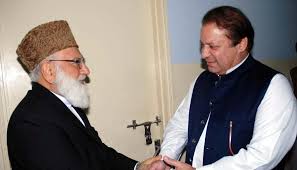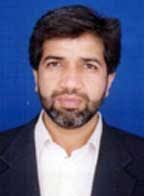



Smokers’ Corner: Speaking fire
Nadeem F. PARACHA
Sunday, 15 Nov, 2009
A blogger makes a valid point in a recent blog on dawn.com. He suggests that the reason why recent election rallies in Gilgit-Baltistan are so diagonally different from those held in the rest of Pakistan is perhaps due to the lack of militant madressahs and the concept of political Islam in that area.
He is also right to note that the language and the overall content of the recent rallies by almost all the leading political parties there are squarely concentrated on various economic and development issues; whereas political rallies held by the same parties elsewhere in Pakistan are usually studded with impassioned sloganeering and jingoistic takes on Islam, India, Jews and America. The general aura of these rallies also smacks of a xenophobic and chauvinistic exhibition of ‘patriotism.’
Till about the late 1960s, political rallies, rather their content, were largely different in Pakistan. The people’s economic wellbeing and the country’s economic progress used to be the focus of the speakers at these rallies. However, things in this respect began to change with the consolidation of Zulfikar Ali Bhutto (as an opposition leader) in 1967.
Already a gifted orator, Bhutto took his cue from the celebrated speakers of the 1960s’ leftist student leaders who in their passionate outbursts addressed economic issues using rhetorical Marxist lingo and revolutionary bravado.
In his speeches at the time, Bhutto too addressed economic issues faced by the people, but he began to use more and more revolutionary symbolism and lingo trying to work the crowds into a captivated frenzy, just like Mao Tse Tung was doing during the Chinese Cultural Revolution. Aggressive vocal posturing became a hallmark of the Bhutto rallies, but this aggression got its first physical manifestation when during the 1970 election campaign, hoards of Jamat-i-Islami (JI) and its student wing, the Islami Jamiat Taleba (IJT) activists, started to attack Bhutto rallies.
In his book, Pakistan People’s Party: Rise to Power, Phillip E. Jones states that PPP rallies became a target of the JI and IJT activists who, incensed by Bhutto’s leftist rhetoric, labelled him as ‘anti-Islam’ and a ‘kafir.’ Till then political rallies were usually attacked and dispersed by government-hired hooligans and the police, so this was perhaps the first time one political party was attacking another party’s rally.
Jones further writes that to counter these attacks by the JI and IJT, the PPP formed the ‘People’s Guards.’ These were groups of tough young men picked from various leftist student organisations, especially the National Students’ Federation (NSF) that was supporting Bhutto. A number of clashes took place between the ‘People’s Guards’ and the JI activists during the 1970 election campaign.
The tone of Bhutto’s speeches became a lot more aggressive after he came to power in 1972 — especially from 1974 onwards, when smitten by the sudden turn that the ideology of Pakistan took after the East Pakistan debacle, both Bhutto and his political-religious opponents began using ‘Islam’ a lot more frequently. It was the Bhutto government which presided over the change of direction Pakistan’s history and school books took after the 1971 civil war in the former East Pakistan. It was also Bhutto who had Ahmadis declared as non-Muslim.
Suddenly, Islam took centre-stage like never before, even to the extent that these books were infused with half-baked truths and historical distortions, mainly so that the ‘two nation theory’ that helped originate the concept of a separate Muslim country in the subcontinent could be defended, especially after the theory had actually collapsed with the creation of Bangladesh (on the basis of ethnicity) in 1971. As Bhutto’s opponents raised the bar of fiery Islamic rhetoric, by the 1977 election campaign, Bhutto too was heard using Islamic symbolism and promises more than revolutionary socialist idioms. General Ziaul Haq who arrived as a military dictator in 1977, soon turned political speechmaking into a calculated expression in which, for the first time, a modern-day political leader was heard using Quranic terms, verses and sometimes whole hadiths. Days of speeches addressing economic and development issues in secular terms became history.
As radical/militant Islam took root in Pakistani society during the Afghan civil war in the 1980s; pro-Zia politicians and religious parties began doing the same. By the 1990s speeches heard at PML-N and JI rallies were usually studded with heavy Islamic symbolism and terms. The trend has continued, so much so, that today, even the more secular parties such as the PPP, ANP and the MQM can’t escape from using Islamic symbolism in their speeches to constantly reinforce their spiritual credentials.
What’s more, the trend has now infested the electronic media as well, where supposedly ‘objective’ newscasters and talk show hosts punctuate their speech and tirades with Islamic terms like Allah, Sharia, Shaheed, etc., as if trying to give their obvious vocal diabolism a righteous sheen. What is being sacrificed is cohesive speech based on facts and a practical vision of the future, a dialogue that is actually a rational discourse on politics, economics and terrorism, instead of an ‘I am holier than you’ clash of bloated egos. Source
Editor's Choice
--------------------------------------------------------------------------------------------------------------------------
Featured Post
--------------------------------------------------------------------------------------------------------------------------
"Let us build Pakistan" has moved.
30 November 2009
All archives and posts have been transferred to the new location, which is: http://criticalppp.com
We encourage you to visit our new site. Please don't leave your comments here because this site is obsolete. You may also like to update your RSS feeds or Google Friend Connect (Follow the Blog) to the new location. Thank you.
We encourage you to visit our new site. Please don't leave your comments here because this site is obsolete. You may also like to update your RSS feeds or Google Friend Connect (Follow the Blog) to the new location. Thank you.
--------------------------------------------------------------------------------------------------------------------------
Sunday, 15 November 2009
Pakistan politics and media: The abuse of Islam for political gains?
Labels:
Baltistan,
Elections,
Gilgit,
Nadeem Paracha,
Radical Islam,
Zulfiqar Ali Bhutto
Subscribe to:
Post Comments (Atom)





















No comments:
Post a Comment
1. You are very welcome to comment, more so if you do not agree with the opinion expressed through this post.
2. If you wish to hide your identity, post with a pseudonym but don't select the 'anonymous' option.
3. Copying the text of your comment may save you the trouble of re-writing if there is an error in posting.